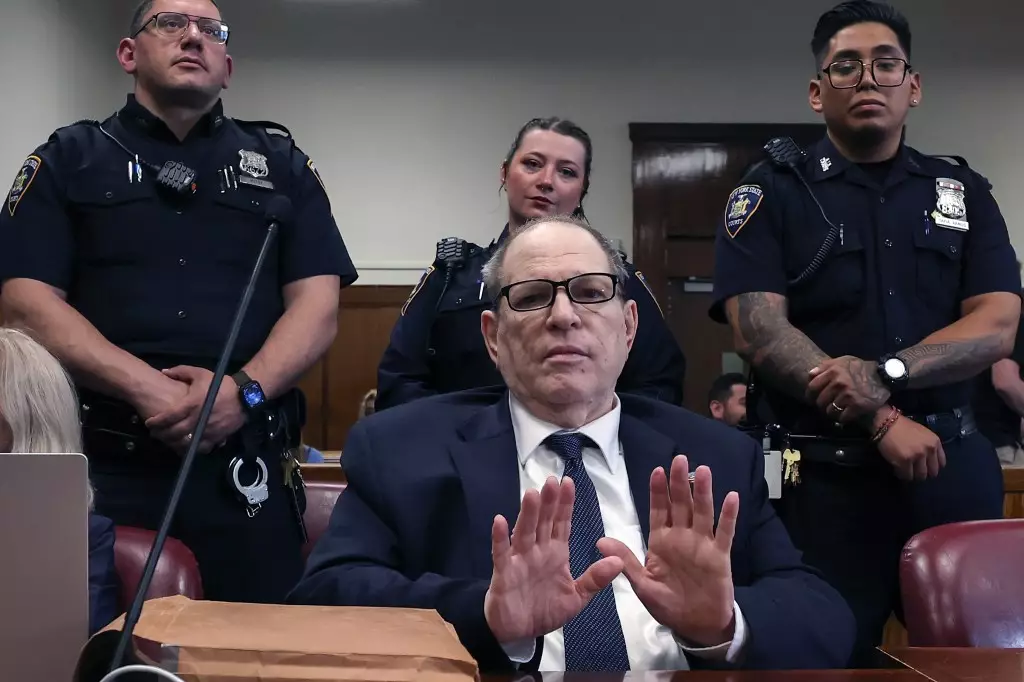The case of Harvey Weinstein is nothing short of a cultural thunderclap, reverberating through the fabric of American society since the New York Times exposé in 2017 unveiled decades of alleged sexual predation. With each courtroom novel unfolding, a sinister narrative playing out, one can’t help but ponder where the scales of justice stand as Weinstein, now 73, faces another trial. The specter of his past actions looms large, casting shadows on whatever modicum of truth or plausibility he might attempt to articulate in his defense. A cascade of events now leads us to ponder the question: Can true justice prevail in a landscape marred by such a grievous scandal?
The Decision to Remain Silent
In a move that has sparked intense debate, Weinstein has chosen not to testify in his New York retrial. Once eager to take the stand and proclaim his innocence, he will instead enter the fray of courtroom drama as a bystander. His spokesperson, Juda Engelmayer, insists this decision is rooted in caution rather than cowardice, suggesting that further scrutiny could complicate the defense. Yet, this approach raises eyebrows and questions motivations. Is Weinstein genuinely interested in safeguarding his integrity, or is this a sensation-seeking ploy to control the narrative without putting himself directly in the line of fire? What is crystal clear, however, is that this masterclass in legal maneuvering highlights the deep-seated issues within the system, where reputation often eclipses justice.
Public Relations vs. Reality
Even as he opts out of testifying, Weinstein appears to perpetuate a guerrilla public relations campaign, utilizing interviews and statements to assert his purported innocence. In a recent conversation with Candace Owens, a figure herself embroiled in controversy, Weinstein claimed he was wrongfully accused, framing his narrative around the distinction between moral wrongness and illegal conduct. Such misdirection is troubling; it seems as though he is trying to redefine the parameters of accountability. In doing so, Weinstein not only undermines the perspectives of his accusers but also reflects a broader societal malaise where powerful individuals can sidestep culpability by manipulating public discourse.
The Impact of the #MeToo Movement
Weinstein’s retrial serves as a litmus test for the evolution of societal norms following the #MeToo movement. The legal strategy employed by his defense, characterized as reduced to claims of consensual relationships, indirectly challenges the very foundation for which this movement stands. By blurring the lines between consent and coercion, the trial threatens to minimize the genuine voices of survivors who have fought valiantly for acknowledgment and redress. The implications are vast and disturbing—if Weinstein’s narrative is allowed to gain traction, it could further obscure the reality for countless victims whose experiences have become fodder for public debate.
A New Chapter in a Prolonged Saga
With the retrial set against a backdrop of political machinations and personal vendettas, one can’t help but view the entire proceedings with skepticism. Moreover, the introduction of a new judge and additional charges in the indictment only add layers of complexity to this already fraught case. Weinstein’s legal journey is emblematic of systemic flaws, revealing how the judicial system can be exploited by those with resources and connections. As yet another opportunity for justice unfolds, the stakes could not be higher. Therefore, this trial is more than just about Harvey Weinstein; it encapsulates a struggle over the power dynamics that define society itself.
The looming verdict is less about what happens to one man, but instead reflects society’s grappling with reckoning and retribution in the aftermath of revelations that shook the very core of Hollywood. As the jury deliberates, the weight of responsibility sits heavily upon their shoulders; with each decision, they script the next chapter in a narrative that is far from over. Justice, it seems, remains a precarious notion nestled in the folds of privilege and power, and the outcome of this retrial may very well determine whether true accountability can indeed exist.


Leave a Reply